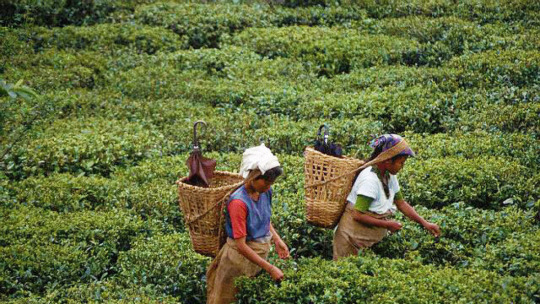#SustainableFarmingIndia
Text
Organic vs. Sustainable Farming in India: What's the Difference?

In recent years, the terms "organic farming" and "sustainable farming" have become buzzwords in the agricultural sector. However, they are often used interchangeably, causing confusion among consumers and farmers alike. Understanding the difference between organic farming and sustainable farming in India is crucial for making informed decisions about agriculture and food consumption. This blog will delve into the nuances of both farming practices, helping you comprehend their significance and impact.
What is Organic Farming?
Organic farming is a method of agriculture that focuses on growing crops without the use of synthetic pesticides, fertilizers, genetically modified organisms (GMOs), and other artificial chemicals. Instead, it emphasizes natural processes and inputs to maintain soil fertility and ecological balance.
Principles of Organic Farming
Soil Health: Organic farming in India prioritizes soil health by using compost, manure, green manures, and crop rotation to enhance soil fertility.
Biodiversity: It encourages biodiversity by planting a variety of crops, which helps in pest management and reduces the risk of disease.
No GMOs: Organic farming strictly prohibits the use of genetically modified organisms.
Natural Pest Control: Instead of synthetic pesticides, organic farmers use natural methods like beneficial insects, neem oil, and trap crops to control pests.
What is Sustainable Farming?
Sustainable farming, on the other hand, is an umbrella term that encompasses various farming practices aimed at maintaining and improving the productivity of the land while minimizing environmental impact. This approach considers long-term ecological balance, economic viability, and social equity.
Principles of Sustainable Farming
Resource Efficiency: Sustainable farming in India focuses on using water, energy, and other resources efficiently to reduce waste.
Ecosystem Health: It aims to protect and enhance the natural environment, including soil, water, and biodiversity.
Economic Viability: Sustainable farming practices ensure that farming is economically feasible for farmers, promoting fair wages and supporting local communities.
Social Responsibility: This approach considers the social aspects of farming, including workers' rights and community well-being.
Key Differences Between Organic and Sustainable Farming
While both organic and sustainable farming share some common goals, they differ significantly in their approaches and principles.
Inputs and Practices
Organic farming strictly prohibits synthetic chemicals and GMOs, relying solely on natural inputs. Sustainable farming, however, is more flexible and may use synthetic inputs if they do not harm the environment and contribute to the long-term sustainability of the farm.
Certification
Organic farming often requires certification to ensure that the practices meet specific standards set by organic certification bodies. In India, this is governed by agencies like the National Programme for Organic Production (NPOP). Sustainable farming does not have a universal certification standard and can vary widely in its implementation.
Focus and Scope
Organic farming primarily focuses on the methods of crop production, emphasizing natural inputs and processes. Sustainable farming takes a broader view, incorporating economic and social aspects along with environmental considerations. It seeks a holistic approach to farming that ensures long-term viability and minimal ecological footprint.
The Impact of Organic and Sustainable Farming in India
Organic Farming in India
Organic farming in India has seen significant growth due to increased consumer awareness about health and environmental benefits. Farmers adopting organic practices often find better market prices and a niche consumer base willing to pay a premium for organic produce. However, the transition to organic farming can be challenging due to the initial lower yields and the need for substantial knowledge and skills.
Sustainable Farming in India
Sustainable farming is gaining traction as it addresses broader issues like climate change, resource depletion, and social equity. Indian farmers adopting sustainable practices can contribute to a more resilient agricultural system, capable of withstanding environmental shocks and economic fluctuations.
Conclusion
In conclusion, understanding the differences between organic and sustainable farming in India is essential for making informed choices that benefit both the environment and society. Organic farming focuses on natural inputs and processes, while sustainable farming encompasses a wider range of practices aimed at long-term ecological, economic, and social sustainability.
At Kavya Organic Farm, we are committed to promoting the best practices in organic farming, ensuring that our produce is not only healthy and safe but also environmentally friendly. By supporting Kavya Organic Farm, you contribute to a healthier planet and a sustainable future.
0 notes
Photo

Celebrating the heart and soul of our nation on Kisan Diwas – Saluting the hands that feed us. #FarmersDay #AgricultureHeroes #KisanDiwas2023 #RespectFarmers #FarmersDayIndia #SupportIndianFarmers #ThankAFarmer #AgricultureLife #SustainableFarmingIndia #IndianAgriculture Visit: https://www.treadonmedia.com/
0 notes
Text
Sustainable Farming in India with Kavya Organic Farm

Explore the future of agriculture with Kavya Organic Farm's sustainable farming in India. At Kavya Organic Farm, we are dedicated to nurturing the land using eco-friendly methods that ensure long-term agricultural health and productivity. Our innovative approach combines traditional knowledge with modern techniques to create a balanced ecosystem that supports biodiversity, enriches soil fertility, and produces high-quality organic crops. By prioritizing sustainability, we not only protect the environment but also contribute to the well-being of local communities. Join us on our mission to promote sustainable farming in India and enjoy the benefits of fresh, nutritious produce grown with care and responsibility. With Kavya Organic Farm, every bite you take supports a greener, healthier planet.
0 notes
Text
Educational Programs on Sustainable Farming in India

As the world grapples with environmental challenges and the need for sustainable development, the significance of sustainable farming in india practices has never been more apparent. In India, educational programs on sustainable farming are pivotal in transforming agricultural practices and empowering farmers to adopt eco-friendly methods. These programs not only enhance the knowledge and skills of farmers but also contribute to the overall health of the environment and the economy. Let's explore how these educational initiatives are shaping the future of Indian agriculture, with a special focus on the contributions of Kavya Organic Farm.
Understanding Sustainable Farming:
Sustainable farming refers to agricultural practices that prioritize environmental health, economic profitability, and social equity. These practices include crop rotation, organic farming, integrated pest management, and agroforestry. Sustainable farming aims to meet current food needs without compromising the ability of future generations to meet their own needs.
The Need for Educational Programs on Sustainable Farming:
Despite the clear benefits of sustainable farming, many farmers in India lack the knowledge and resources to implement these practices effectively. Educational programs on sustainable farming address this gap by providing farmers with the necessary training and tools. These programs cover a wide range of topics, including soil health management, water conservation, organic farming techniques, and market access for sustainably produced goods.
Key Components of Educational Programs:
Workshops and Training Sessions:
Educational programs often include hands-on workshops and training sessions. These sessions allow farmers to learn about sustainable farming practices through practical demonstrations and field visits. They cover essential topics such as composting, crop diversification, and natural pest control methods.
Online Courses and Resources:
With the advent of technology, online courses have become an integral part of educational programs on sustainable farming. These courses offer flexibility and accessibility, enabling farmers from remote areas to gain knowledge at their own pace. Online resources include video tutorials, e-books, and interactive forums.
Collaboration with Agricultural Institutions:
Many educational programs collaborate with agricultural universities and research institutions. These partnerships facilitate the exchange of knowledge and the latest research findings. Farmers benefit from expert insights and can apply cutting-edge techniques to their farming practices.
Community-Based Learning:
Community-based learning initiatives promote peer-to-peer knowledge sharing. Farmers gather in groups to discuss challenges, share experiences, and collectively solve problems. This approach fosters a sense of community and mutual support among farmers.
Success Stories:
Educational programs on sustainable farming have already shown promising results across India. For instance, in the state of Andhra Pradesh, the Community Managed Natural Farming (CMNF) program has trained over 500,000 farmers in sustainable practices. This initiative has led to increased crop yields, improved soil health, and higher incomes for participating farmers.
The Role of Kavya Organic Farm:
Kavya Organic Farm is at the forefront of promoting sustainable farming in India through its comprehensive educational programs. By offering workshops, online courses, and community-based learning sessions, Kavya Organic Farm equips farmers with the skills and knowledge needed to implement sustainable practices. The farm's commitment to sustainability extends beyond training; it also provides ongoing support and mentorship to ensure the successful adoption of these practices.
Conclusion:
Educational programs on sustainable farming in India are crucial for building a resilient agricultural sector. By empowering farmers with the knowledge and tools to adopt sustainable practices, these programs contribute to environmental conservation, economic stability, and social well-being. Kavya Organic Farm is a shining example of how dedicated efforts in education and training can drive positive change in the agricultural landscape. As the demand for sustainable farming practices grows, Kavya Organic Farm's educational initiatives are set to play a pivotal role in shaping the future of farming in India.
0 notes
Text
The Role of Consumers in Driving Demand for Sustainable Agriculture Products in India
In the age of climate change and environmental degradation, the importance of sustainable agriculture cannot be overstated. As consumers become increasingly conscious of the impact of their choices on the planet, there's a growing demand for sustainable agriculture products. In India, this trend is gaining momentum, with consumers playing a pivotal role in driving the shift towards eco-friendly farming practices. Let's explore how consumer behavior is shaping the future of agriculture in India and why companies like Kavya Organic Farm are at the forefront of this movement.

The Rise of Conscious Consumerism:
Gone are the days when consumers made purchasing decisions solely based on price and convenience. Today, there's a heightened awareness about the environmental and social consequences of consumer choices. From organic fruits and vegetables to ethically sourced grains and pulses, consumers are actively seeking out products that align with their values of sustainability and responsibility.
The Power of Consumer Demand:
Consumer demand has the power to drive significant changes across industries, and agriculture is no exception. As more consumers prioritize sustainability, there's a growing market for organic, pesticide-free, and ethically produced agricultural products. This shift in demand is not only beneficial for the environment but also for farmers who adopt Sustainable farming in India practices.
Educating Consumers:
However, for consumer demand to drive meaningful change, there's a need for education and awareness. Many consumers may not fully understand the benefits of sustainable agriculture or how their choices impact the environment. Companies like Kavya Organic Farm play a crucial role in educating consumers about the importance of sustainable farming methods and the benefits of choosing organic products.
Supporting Local Farmers:
One of the key pillars of sustainable agriculture is supporting local farmers and promoting biodiversity. By purchasing products from local farms, consumers not only reduce their carbon footprint but also support small-scale farmers and rural communities. Companies like Kavya Organic Farm work closely with local farmers, providing them with training, resources, and market access to help them transition to organic farming practices.
The Role of Certification:
Certification plays a vital role in assuring consumers of the authenticity and quality of sustainable agriculture products. Organic certifications, such as those provided by renowned organizations like USDA Organic and India Organic, give consumers confidence that the products they're purchasing meet strict organic standards. Companies like Kavya Organic Farm adhere to these certifications, ensuring transparency and trustworthiness in their products.
Conclusion:
In conclusion, consumers wield immense power in driving demand for sustainable agriculture products in India. By making informed choices and supporting companies that prioritize sustainability, consumers can contribute to a healthier planet and a more resilient agricultural system. As the demand for sustainable products continues to grow, companies like Kavya Organic Farm are poised to lead the way, offering high-quality organic products that meet the needs of conscious consumers. Together, we can create a more sustainable future for agriculture in India.
0 notes